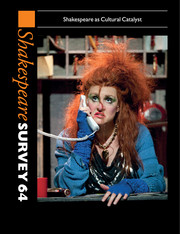Book contents
- Frontmatter
- CONTENTS
- ILLUSTRATIONS
- The Commercial Bard: Business Models for the Twenty-First Century
- International Innovation? Shakespeare as Intercultural Catalyst
- Brand Shakespeare?
- Global Shakespeare 2.0 and the Task of the Performance Archive
- An International Database of Shakespeare on Film, Television and Radio
- ‘Sounds and Sweet Airs’: Music in Shakespearian Performance History
- Using Shakespeare with Memes, Remixes and Fanfic
- ‘Pretty Much how the Internet Works’; or, Aiding and Abetting the Deprofessionalization of Shakespeare Studies
- Catalysing What? Historical Remediation, the Musical, and What of Love's Labour's Lasts
- Kabuki Twelfth Night and Kyogen Richard III: Shakespeare as a Cultural Catalyst
- The Sonnets as an Open-Source Initiative
- ‘A Stage of the Mind’: Hamlet on Post-War British Radio
- Post-Textual Shakespeare
- I am What I am Not: Identifying with the Other in Othello
- Desdemona's Book, Lost and Found
- Non-Catalyst and Marginal Shakespeares in the Nineteenth-Century Revival of Catalan-Speaking Cultures
- Shakespeare, Mácha and Czech Romantic Historicism
- An Irish Catalysis: W. B. Yeats and the Uses of Shakespeare
- François-Victor Hugo and the Limits of Cultural Catalysis
- ‘You Taught me Language’: Shakespeare in India
- There is Some Soul of Good: An Action-Centred Approach to Teaching Shakespeare in Schools
- The Royal Shakespeare Company as ‘Cultural Chemist’
- Shakespeare at the White Greyhound
- Dark Matter: Shakespeare’s Foul Dens and Forests
- What We Hear; What we see: Theatre for a New Audience's 2009 Hamlet
- Narrative of Negativity: Whig Historiography and the Spectre of King James in Measure for Measure
- Québécois Shakespeare goes Global: Robert Lepage's Coriolan
- Endless Mornings on Endless Faces: Shakespeare and Philip Larkin
- Shakespeare Performances in England 2010
- Professional Shakespeare Productions in the British Isles, January–December 2009
- The Year’s Contribution to Shakespeare Studies
- INDEX
- References
Endless Mornings on Endless Faces: Shakespeare and Philip Larkin
Published online by Cambridge University Press: 28 November 2011
- Frontmatter
- CONTENTS
- ILLUSTRATIONS
- The Commercial Bard: Business Models for the Twenty-First Century
- International Innovation? Shakespeare as Intercultural Catalyst
- Brand Shakespeare?
- Global Shakespeare 2.0 and the Task of the Performance Archive
- An International Database of Shakespeare on Film, Television and Radio
- ‘Sounds and Sweet Airs’: Music in Shakespearian Performance History
- Using Shakespeare with Memes, Remixes and Fanfic
- ‘Pretty Much how the Internet Works’; or, Aiding and Abetting the Deprofessionalization of Shakespeare Studies
- Catalysing What? Historical Remediation, the Musical, and What of Love's Labour's Lasts
- Kabuki Twelfth Night and Kyogen Richard III: Shakespeare as a Cultural Catalyst
- The Sonnets as an Open-Source Initiative
- ‘A Stage of the Mind’: Hamlet on Post-War British Radio
- Post-Textual Shakespeare
- I am What I am Not: Identifying with the Other in Othello
- Desdemona's Book, Lost and Found
- Non-Catalyst and Marginal Shakespeares in the Nineteenth-Century Revival of Catalan-Speaking Cultures
- Shakespeare, Mácha and Czech Romantic Historicism
- An Irish Catalysis: W. B. Yeats and the Uses of Shakespeare
- François-Victor Hugo and the Limits of Cultural Catalysis
- ‘You Taught me Language’: Shakespeare in India
- There is Some Soul of Good: An Action-Centred Approach to Teaching Shakespeare in Schools
- The Royal Shakespeare Company as ‘Cultural Chemist’
- Shakespeare at the White Greyhound
- Dark Matter: Shakespeare’s Foul Dens and Forests
- What We Hear; What we see: Theatre for a New Audience's 2009 Hamlet
- Narrative of Negativity: Whig Historiography and the Spectre of King James in Measure for Measure
- Québécois Shakespeare goes Global: Robert Lepage's Coriolan
- Endless Mornings on Endless Faces: Shakespeare and Philip Larkin
- Shakespeare Performances in England 2010
- Professional Shakespeare Productions in the British Isles, January–December 2009
- The Year’s Contribution to Shakespeare Studies
- INDEX
- References
Summary
I don't want to transcend the commonplace, I love the commonplace…Everyday things are lovely to me.
Philip LarkinFor Shakespeare, in the matter of religion, the choice lay between Christianity and nothing. He chose nothing; he chose to leave his heroes and himself in the presence of life and of death with no other philosophy than that which the profane world can suggest and understand.
George Santayana, ‘The Absence of Religion in Shakespeare’ (1899)The critic in search of Larkin's ‘sources’ will have a tough time of it. It is hard to imagine Larkin himself enthusiastic about such a quest: he thought poetry should issue out of what he called ‘unsorted experience’ – ‘I tried to keep literature out of my poems’, he said. His literary personality was defined against that of modernist scholar-magpies like Eliot and Auden – poets he respected, but warily. In a review of 1960 he reproached Auden for intellectualism and arch literary game-playing – implicitly, the antithesis of his own poetry, which was to be understood as a record of personal experience.
- Type
- Chapter
- Information
- Shakespeare Survey , pp. 328 - 339Publisher: Cambridge University PressPrint publication year: 2011

